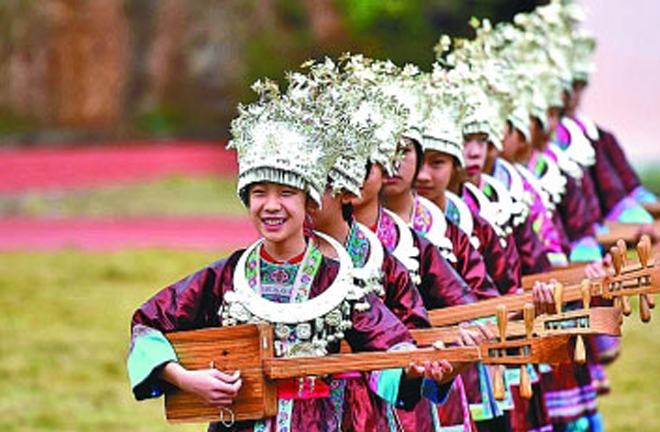Racing against time: China’s collective preservation of centuries-old traditions

Pipa is a plucked string instrument with a history of more than 2,000 years. Students learn pipa songs of the Dong Minority at schools in Guangxi Zhuang Autonomous Region, so that the skills can be revived in future generations. (XINHUA)
At a recent forum in Beijing, experts called attention to the urgent task of recording the essence of national intangible cultural heritage. Since 2015, the China National Library, local preservation centers and documentary teams have recorded the skills and cultural memories of 227 aging inheritors. The project is expected to cover nearly a thousand inheritors across the country, according to the forum.
Inheritors master traditions and pass the legacy on to the next generation. The core value lies in their traditional skills, life-long experience as well as their cultural memories and teaching methods, forming a wellspring of preservation and development. However, some traditions are at risk of dying out because the inheritors, in their twilight years, haven’t found younger people to teach the skills.
To date, China has recognized nearly 3,100 representative inheritors of national intangible cultural heritage in five batches, but more than 400 of them have passed away, according to China Memory Project Center of China National Library. Departure of each inheritor may mean the extinction of a marvelous skill and its related folk customs. This is an irreversible loss, said Zhang Qingshan, a research fellow from the Chinese National Academy of Arts and the director for controlling the project’s quality.
Domestic protection of intangible cultural heritage falls into three categories with focuses on production, rescue and integrity. In terms of guidance, preservation is the ultimate aim and rescue is the primary work. Therefore, it is an urgent task to collect and record the traditional skills and cultural memories of the inheritors. The former Ministry of Culture initiated the project to preserve the skills of elderly inheritors by means of material collection as well as audiovisual recording.
The project promotes the goal of recording inheritors’ oral history, skill demonstration and teaching lessons. It also aims to collect comprehensive documents, thus establishing a systematic database for each inheritor. The scattered material will be made into documentaries for public dissemination.
“We can do nothing about the lost lives and time. But we can compete with time to preserve the valuable cultural heritage,” Zhang said.
Pan Zhen is the director of the documentary about Qin Dexiang, the representative inheritor of the Changzhou chant, a traditional musical form that originated in Changzhou, Jiangsu Province. He wrote in his filming notes that “Qin had been diagnosed with cancer when the project kicked off. Fortunately, we finished all the recordings before the elderly inheritor’s departure from the world nine months later.”
China Memory Project Center is responsible for providing academic consultation and quality control for the rescue project. The center contributed working norms and operational guidance, setting the standards of the undertaking, and it also trained the teams, said the center director Tian Miao.
The center has gathered experts on such areas as intangible cultural heritage, documentary filmmaking and document collection to examine the project’s outcomes on around 240 items since September 2017. As of this May, it had collected more than 200 qualified items and 25 excellent items.
This rescue work has made progress in two metrics. One refers to a renewed knowledge system, which includes practical solutions and standards for recording the centuries-old traditions. The other one is credited for a document collection pattern that involves national organizations, expert panels and social groups, said Bao Jun, a research fellow from the Institute for Sociology at the Chinese Academy of Social Sciences (CASS).
Inheritors are the fuel that keeps the fire burning. The project is looking for more inheritors so that they can teach skills to the next generation. In past times, most folk arts and crafts had rigid codes. For example, some could only be taught to male learners or family members, which means many inheritors would rather see the skills die out than break ancestral instructions. “In today’s society, fewer talented people have passion to learn skills and devote themselves to the undertaking for years, so the elderly inheritors have chosen to pump the brakes on the previous inheritance models and seek greater influence,” said Yang Jianian who was recently recognized as a national representative inheritor.
“Several of my apprentices have become famous. Others are numerous. I participate in the campus activities about traditional skills every year,” said 80-year-old inheritor Qin Mengyu. The project has involved a batch of artists and craftsmen who make concerted efforts to promote the inheritance of cultural heritage in their twilight years.
The artists and craftsmen have consciously recognized the historical and cultural value of their skills when they became representative inheritors. It is their obligation to safeguard the cause, said Liu Likui, Honorary CASS Member and a renowned scholar of intangible cultural heritage protection.
“The valuable skills should be recorded, but also used,” said Zhang, adding that the faculty can file and preserve the project’s outcomes for future studies, thus fueling the prosperity of intangible cultural heritage.
The project gained outcomes concerning oral history and introductive documentary as well as video works for learning and dissemination. “Some inheritors are so good at teaching. Their attractive demonstrations offer visual lessons for reviving age-old traditions,” Tian said.
“Time flies without recession while skills may be retained forever. I hope the rescue project can solicit people’s attention to protecting intangible cultural heritage. We can double down on this mission of the times and have no guilt before our ancestors and future generations,” Zhang said.
This article was abridged and translated from Guangming Daily.
(edited by MA YUHONG)
